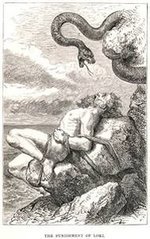
Loki
Loki: The Shape-Shifting God of Mischief in Norse Mythology
Loki: The Shape-Shifting God of Mischief in Norse Mythology
Who is Loki and what are his powers?
Loki is a god in Norse mythology who is often simply described as the ‘trickster’ god for his love of playing pranks on both his fellow gods and his or their opponents. He is the son of the giant Fárbauti and the goddess Laufey, and he has two brothers, Helblindi and Býleistr. He is also the father of many monstrous children, such as the wolf Fenrir, the serpent Jormungand, and the goddess of death Hel. Loki has the ability to change his shape and sex, and he can transform into any animal or object. He is also very cunning and persuasive, and he can lie and deceive with ease. He is often depicted as having red hair and a mischievous smile.
How did Loki help and hinder the other gods?
Loki was included among the Aesir, a tribe of gods who lived in Asgard, and he was the companion of the great gods Odin and Thor. He helped them with his clever plans but sometimes caused embarrassment and difficulty for them and himself. For example, he helped Odin to obtain the mead of poetry from the giant Suttung, but he also stole Sif’s golden hair and replaced it with a wig made by the dwarves. He helped Thor to retrieve his hammer Mjolnir from the giant Thrym, but he also arranged for Thor to dress as a bride and marry Thrym. He helped the gods to build the wall around Asgard, but he also gave birth to Sleipnir, the eight-legged horse of Odin, after mating with a stallion. He helped the gods to acquire many precious gifts from the dwarves, but he also provoked a fight between the gods and the giants by insulting them at a feast.
How did Loki cause the death of Balder and the start of Ragnarok?
Loki’s most notorious and tragic deed was causing the death of Balder, the beloved god of light and joy. Balder was destined to die by a prophecy that his mother Frigg heard, and she made everything in the world swear an oath not to harm him. However, she overlooked the mistletoe, a seemingly harmless plant, and Loki used it to kill Balder. Loki disguised himself as an old woman and tricked Frigg into revealing that the mistletoe was the only thing that could hurt Balder. Then he made a dart out of the mistletoe and gave it to Hod, Balder’s blind brother, and guided his hand to throw it at Balder. The dart pierced Balder’s heart and he fell dead. Balder’s death caused great grief and anger among the gods, and they tried to bring him back from the underworld, but failed. Balder’s death also marked the beginning of the end of the world, as it was one of the signs of Ragnarok, the doom of the gods.
What was Loki’s fate and legacy?
Loki’s role in Balder’s death made him an enemy of the gods, and they captured him and bound him to a rock with a venomous snake dripping poison on his face. His wife Sigyn tried to catch the poison in a bowl, but when she had to empty it, the poison would drip on Loki and make him writhe in pain. He remained in this state until the onset of Ragnarok, when he broke free and joined the forces of the giants against the gods. He fought against his former friend Heimdall, the guardian of the rainbow bridge Bifrost, and they killed each other. Loki’s children also played important roles in Ragnarok: Fenrir swallowed Odin, Jormungand fought Thor and poisoned him, and Hel received the souls of the dead.
Loki’s legacy
Loki’s legacy is complex and ambiguous. He is both a hero and a villain, a creator and a destroyer, a friend and an enemy. He is a source of entertainment and trouble, of wisdom and folly, of chaos and order. He is a symbol of the unpredictable and the inevitable, of the freedom and the fate, of the mischief and the doom. He is one of the most fascinating and influential characters in Norse mythology, and his stories have inspired many works of art and literature, as well as adaptations in modern media, such as the Marvel Cinematic Universe
Loki Video
Loki Q&A
Link/Cite Loki Page
Written by: The Editors of GreekMythology.com. GreekMythology.com editors write, review and revise subject areas in which they have extensive knowledge based on their working experience or advanced studies.
For MLA style citation use: GreekMythology.com, The Editors of Website. "Loki". GreekMythology.com Website, 30 Nov. 2023, https://www.greekmythology.com/Myths/Norse/Loki/loki.html. Accessed 26 April 2024.
